人教版英语一轮复习:必修5 Unit 1 Great Scientists课件(46张)
文档属性
| 名称 | 人教版英语一轮复习:必修5 Unit 1 Great Scientists课件(46张) |
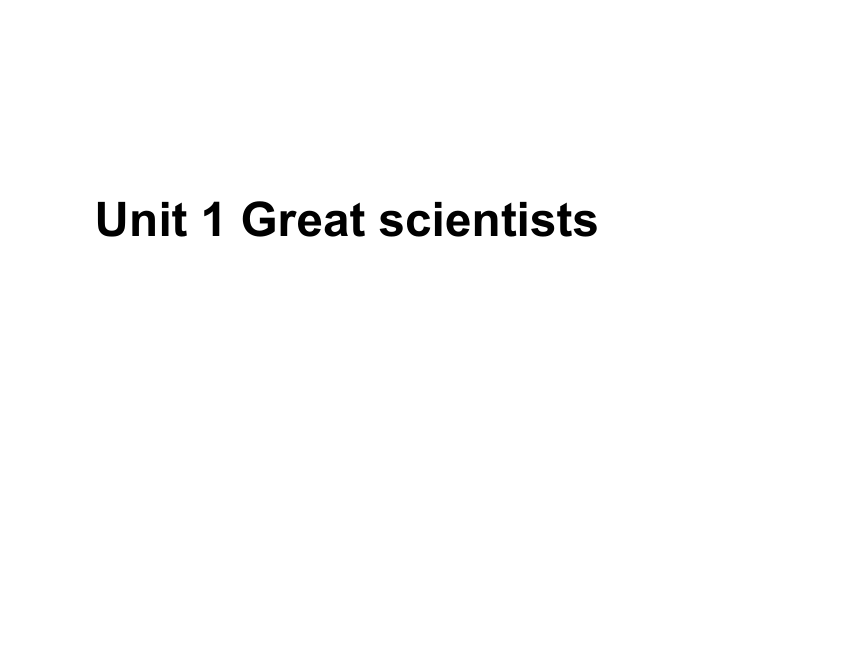
|
|
| 格式 | zip | ||
| 文件大小 | 691.5KB | ||
| 资源类型 | 教案 | ||
| 版本资源 | 人教版(新课程标准) | ||
| 科目 | 英语 | ||
| 更新时间 | 2018-12-28 00:00:00 | ||
图片预览

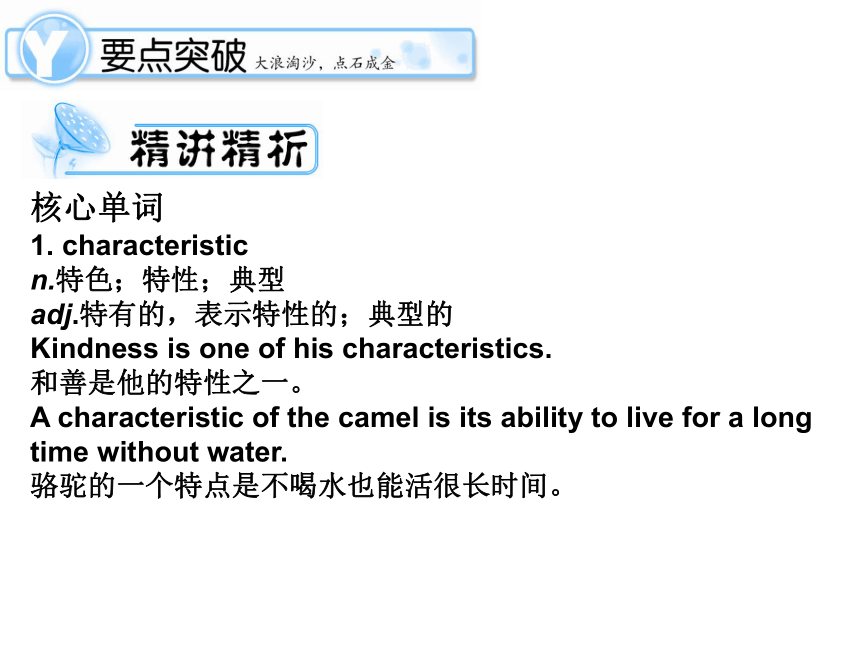
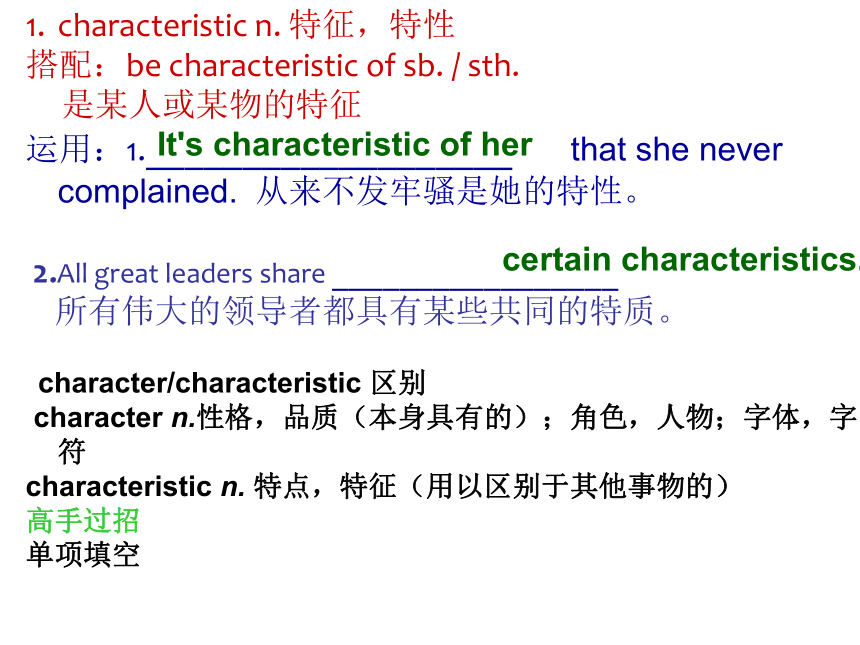
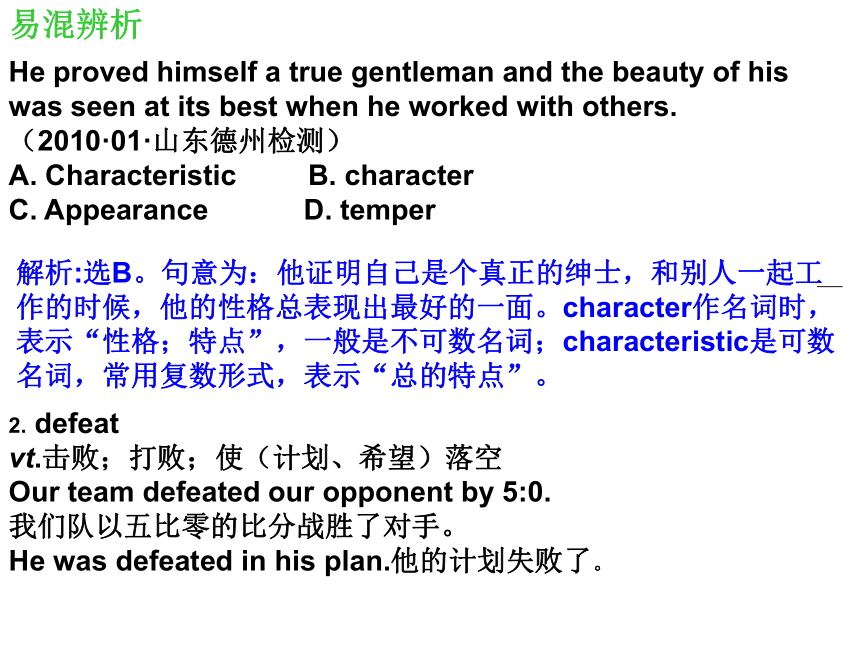
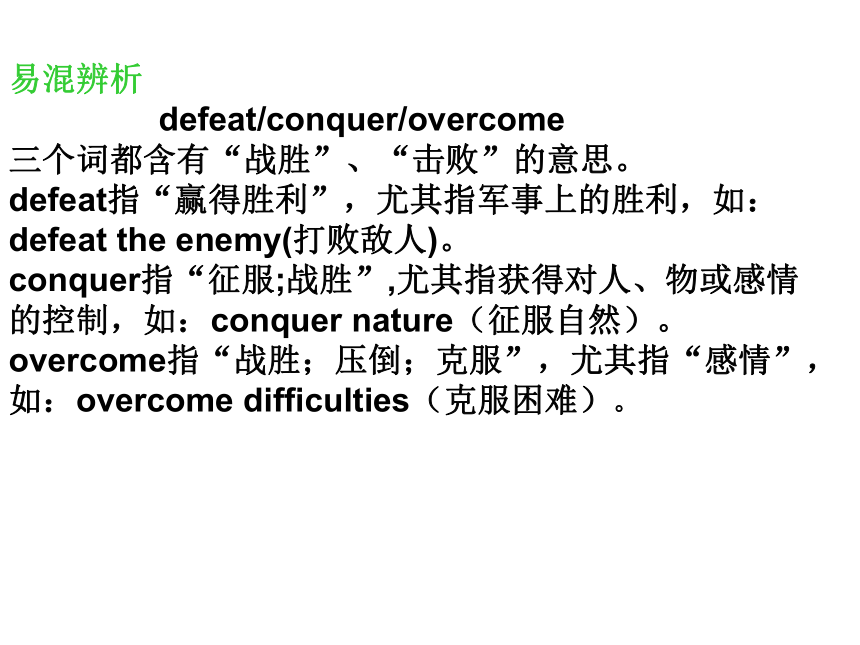

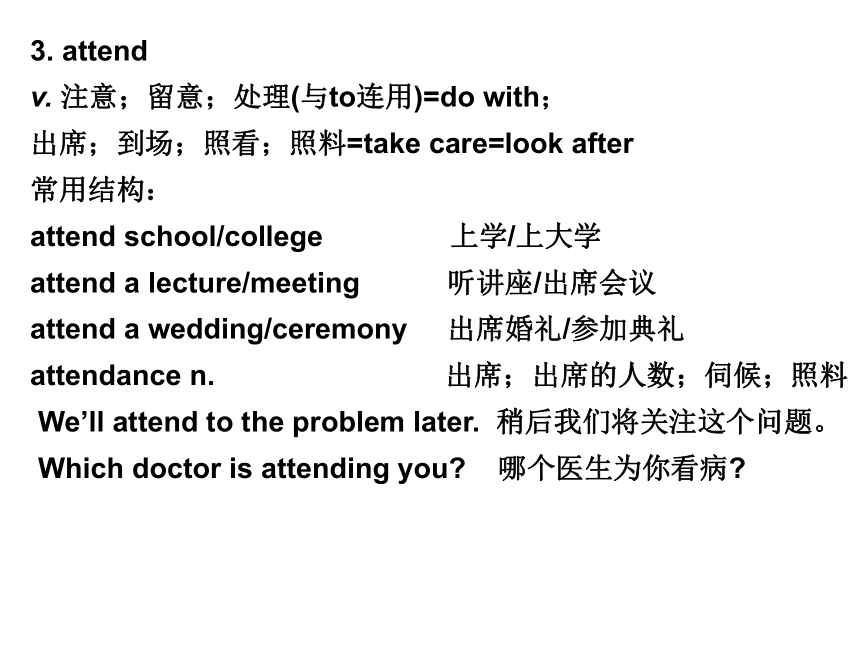
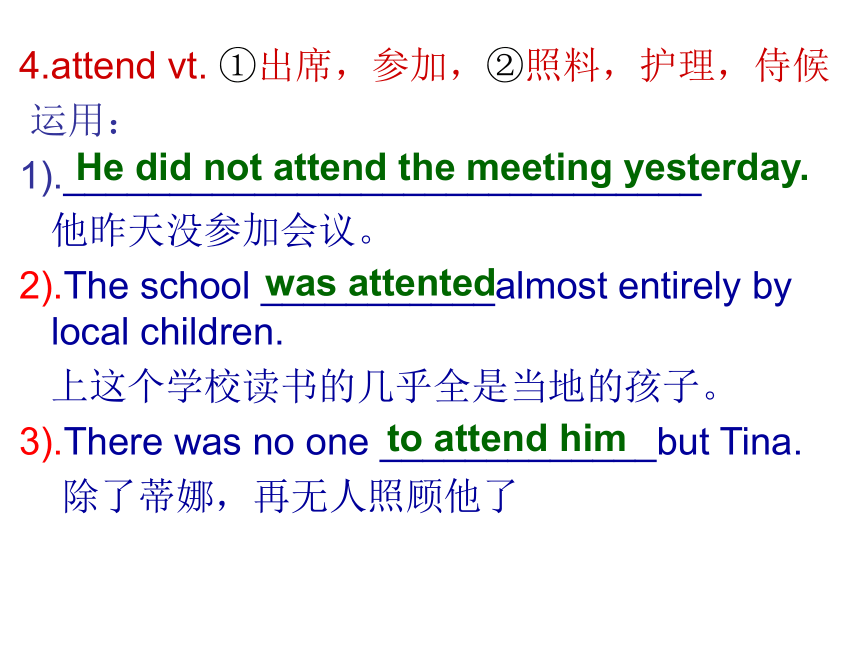
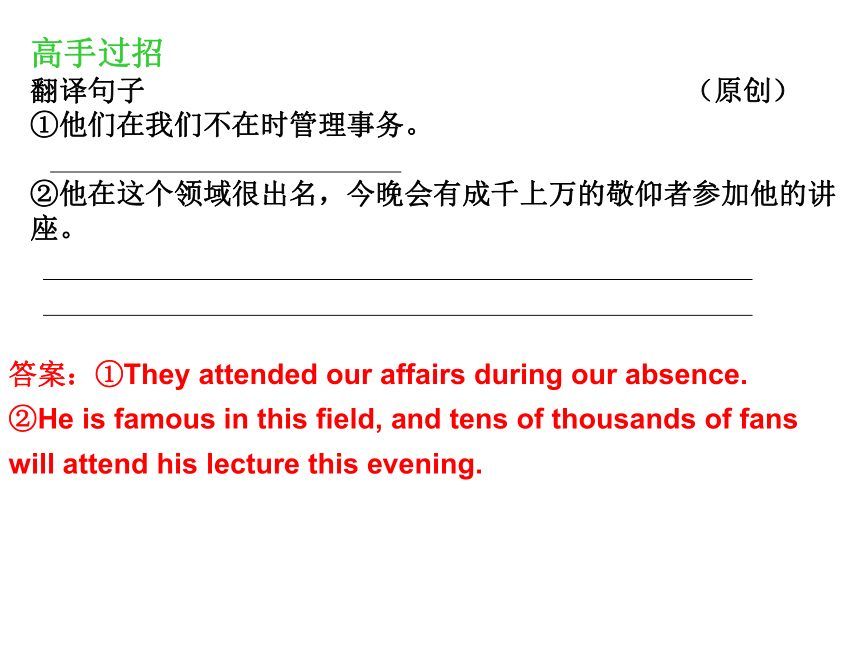
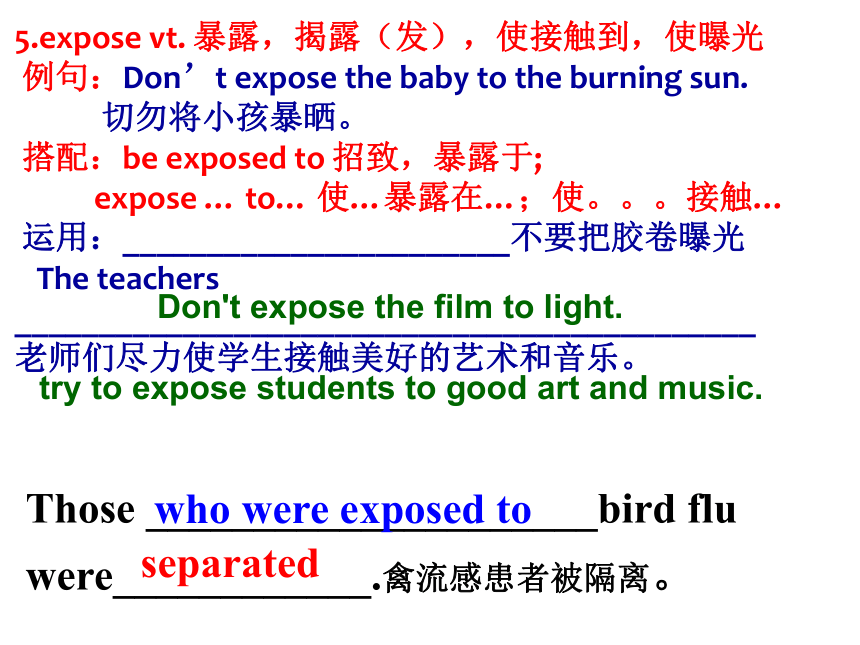
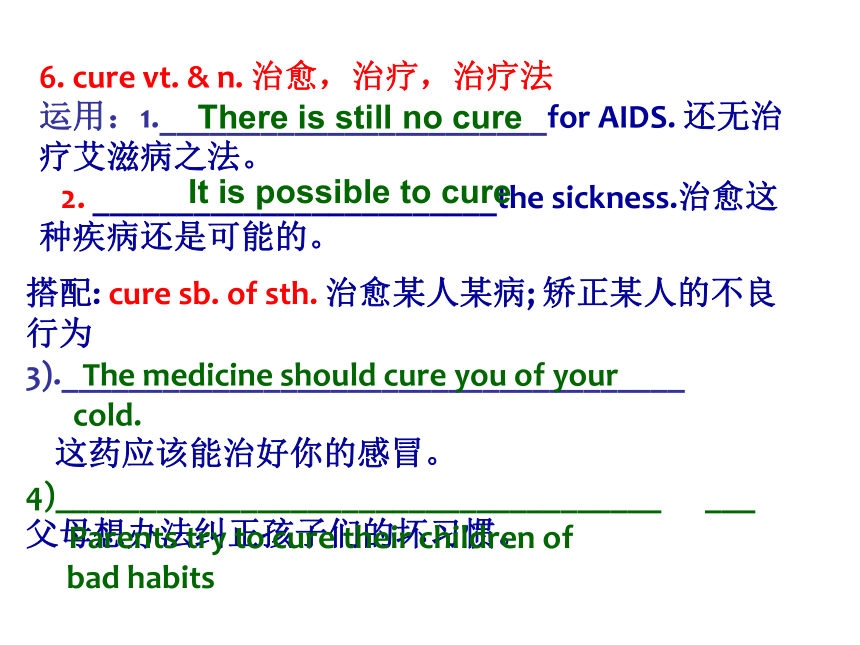

文档简介
Unit 1 Great scientists
核心单词
1. characteristic
n.特色;特性;典型
adj.特有的,表示特性的;典型的
Kindness is one of his characteristics.
和善是他的特性之一。
A characteristic of the camel is its ability to live for a long time without water.
骆驼的一个特点是不喝水也能活很长时间。
characteristic n. 特征,特性
搭配:be characteristic of sb. / sth.
是某人或某物的特征
运用:1.___________________ that she never complained. 从来不发牢骚是她的特性。
2.All great leaders share _________________
所有伟大的领导者都具有某些共同的特质。
character/characteristic 区别
character n.性格,品质(本身具有的);角色,人物;字体,字符
characteristic n. 特点,特征(用以区别于其他事物的)
高手过招
单项填空
It's characteristic of her
certain characteristics.
He proved himself a true gentleman and the beauty of his was seen at its best when he worked with others. (2010·01·山东德州检测)
A. Characteristic B. character
C. Appearance D. temper
解析:选B。句意为:他证明自己是个真正的绅士,和别人一起工作的时候,他的性格总表现出最好的一面。character作名词时,表示“性格;特点”,一般是不可数名词;characteristic是可数名词,常用复数形式,表示“总的特点”。
易混辨析
2. defeat
vt.击败;打败;使(计划、希望)落空
Our team defeated our opponent by 5:0.
我们队以五比零的比分战胜了对手。
He was defeated in his plan.他的计划失败了。
易混辨析
defeat/conquer/overcome
三个词都含有“战胜”、“击败”的意思。
defeat指“赢得胜利”,尤其指军事上的胜利,如:defeat the enemy(打败敌人)。
conquer指“征服;战胜”,尤其指获得对人、物或感情的控制,如:conquer nature(征服自然)。
overcome指“战胜;压倒;克服”,尤其指“感情”,如:overcome difficulties(克服困难)。
defeat/beat/win
defeat, beat都表示在战斗或竞赛中“战胜,打败(对手)”,后接竞争对手。如:beat the competitor/the country/the team ...打败对手/国家/团队……
win也表示“战胜,赢得”,但它的宾语通常是比赛、战争、奖品或表示尊重、崇拜之类意义的词。如:win a race/a battle/a war/a scholarship/a prize/a medal/success/friendship/reward ...赢得比赛/战役/战争/奖学金/奖品/奖章/成功/友谊/奖赏……
高手过招
选词填空(beat/defeat/conquer/win) (原创)
①By not working hard enough you your own purpose.
②Some countries may be but can never be .
③Who is the drum?
④He the first prize in the writing contest.
答案:①defeated ②defeated; conquered
③beating ④won
3. attend
v. 注意;留意;处理(与to连用)=do with;
出席;到场;照看;照料=take care=look after
常用结构:
attend school/college 上学/上大学
attend a lecture/meeting 听讲座/出席会议
attend a wedding/ceremony 出席婚礼/参加典礼
attendance n. 出席;出席的人数;伺候;照料
We’ll attend to the problem later. 稍后我们将关注这个问题。
Which doctor is attending you? 哪个医生为你看病?
4.attend vt. ①出席,参加,②照料,护理,侍候
运用:
1).______________________________
他昨天没参加会议。
2).The school ___________almost entirely by local children.
上这个学校读书的几乎全是当地的孩子。
3).There was no one _____________but Tina.
除了蒂娜,再无人照顾他了
He did not attend the meeting yesterday.
was attented
to attend him
高手过招
翻译句子 (原创)
①他们在我们不在时管理事务。
②他在这个领域很出名,今晚会有成千上万的敬仰者参加他的讲座。
答案:①They attended our affairs during our absence.
②He is famous in this field, and tens of thousands of fans will attend his lecture this evening.
5.expose vt. 暴露,揭露(发),使接触到,使曝光
例句:Don’t expose the baby to the burning sun.
切勿将小孩暴晒。
搭配:be exposed to 招致,暴露于;
expose … to… 使…暴露在…;使。。。接触…
运用:_______________________不要把胶卷曝光
The teachers ____________________________________________
老师们尽力使学生接触美好的艺术和音乐。
Don't expose the film to light.
try to expose students to good art and music.
Those _____________________bird flu were____________.禽流感患者被隔离。
who were exposed to
separated
6. cure vt. & n. 治愈,治疗,治疗法
运用:1._______________________for AIDS. 还无治疗艾滋病之法。
2. ________________________the sickness.治愈这种疾病还是可能的。
There is still no cure
It is possible to cure
搭配: cure sb. of sth. 治愈某人某病; 矫正某人的不良行为
3)._____________________________________
这药应该能治好你的感冒。
4)____________________________________ ___
父母想办法纠正孩子们的坏习惯。
The medicine should cure you of your
cold.
Parents try to cure their children of
bad habits
易混辨析
cure/treat/heal/recover
cure意为“治疗;治愈”,多用于指药物治疗并治愈某种疾病或改正不良习气。
treat为日常用语,意为“治疗;医治”,指治疗病人的全过程或活动。
heal意为“治愈(伤口);医治”,指治好外伤或烧伤后的部位,使伤口愈合,不用于指治疗感冒等疾病。
recover意为“痊愈,复原”,主要是指从病中痊愈了,常与from连用。
That pill cured my headache.那种药片治好了我的头疼。
That will cure him of his bad habits.那将改正他的坏习惯。
There are only two doctors to treat more than 50 patients.
只有两名医生来治疗50多个病人。
The wound on my arm has healed.我胳膊上的伤已痊愈了。
He’s now fully recovered from his bad cold.
他现在已完全从重感冒中康复了。
高手过招
完成句子 (原创)
①盘尼西林治好了他的肺炎。
Penicillin his pneumonia.
②事故后卡车司机的擦伤得到了治疗。
After the accident, the lorry driver for cuts and bruises.
③他手指上的伤口很快愈合了。
The cut on his finger quickly.
答案:①cured him of ②was treated ③healed
6. absorb
vt. 吸收;吸引;吸收(液体,气体,光,声等);汲取,理解(知识等);使全神贯注;吸引(注意等),后常接介词in/by;合并(公司等);吞并;常接介词into;承受;经受。
搭配:be absorbed in sth. / doing sth.全神贯注于某事;
be absorbed into 被吸入(并入)
联想拓展
absorbed adj. 精神集中的
absorbing adj. 十分吸引人的
absorb from sth. 从……中吸收
be absorbed in 专心于,全神贯注于
Cotton gloves absorb sweat. 棉手套吸汗。
So many good ideas! It’s too much for me to absorb all at once. 这么多好主意!我很难一下子完全吸收。
The old man was completely absorbed in the book.
老人全神贯注地读这本书。
The surrounding small towns have been absorbed into the city. 四周的小城镇已并入到这座城市中。
高手过招
完成句子 (原创)
①那个人因为看报纸太入神而撞到了墙上。
,the man walked into a wall.
②他们聚精会神地看着电视里的表演,舍不得离开。
They were the show on television that they found it hard to pull away.
答案:①Deeply absorbed in the newspaper
②so deeply absorbed in watching
7. blame
vt.责备;谴责;归咎于
n.责怪;(过失、过错等)责任
常用结构:
blame sb. for (doing) sth. 因(做)某事而指责某人
blame sth. on sb. 因某事而指责某人
sb. be to blame for(doing) sth. 因(做)某事某人应受到谴责
The student blamed the teacher for his failure.
学生因失败而责怪老师。
The careless driver is to blame for the traffic accident happening yesterday.
那个粗心的司机该为昨天发生的交通事故负责。
Who is to blame for the failure?
谁该为这次的失败负责?
温馨提示
be to blame 应负责(无被动形式)
高手过招
(1)单项填空
We all feel it is Jack as well as his wife that for their son’s bad performance at school.
(2010·01·陕西西安检测)
A. are to blame B. is to be blamed
C. are to be blamed D. is to blame
(2)翻译句子
①看来霍乱的流行要归罪于饮用水了。 (原创)
②这件事谁也不能怨。
③他指责你玩忽职守。
解析: (1)选D。句意为:我们觉得对于孩子在学校里的不好表现,除了杰克的妻子外,杰克也有责任。be to blame是习惯表达方式,要用主动形式表示被动含义。且主语为Jack,故选D项。
(2) ①It seemed that the water was to blame for cholera. ②Nobody is to blame for it. ③He blames you for your neglect of duty.
8. link
vt. 连接;联系
n. 环;连接;联系;纽带
常用结构:
link ...to/with 将……和……连接/联系起来
link up 连接起来
The highway links Shanghai to/with Beijing.
这条公路连接着上海和北京。
Your story links up with his.
你所说的和他所说的能联系起来。
A lot of links fitted together form a chain.
许多链环连在一起组成链条。
Old friends are a link with the past.
老朋友是连接往事的纽带。
易混辨析
join/connect/combine/unite
join指的是任何事物的直接连接,连接的程度可紧可松,含有“还能分开”之意。常用结构join ...to, join up。
connect指的是通过某种媒介物把事物连接起来,事物的特征还保持着,常表示与技术有关的连接以及火车、飞机等实行联运。常用结构connect ...with/to。
combine着重指两个或两个以上的人或事物为了共同的目的而结合在一起,结合后原来的部分可能仍不改变,但也可能失去其本性,常用结构combine ...with。
unite强调紧密地结合成一体,含极难分开之意,常用结构unite ...with。
Please join this pole to that one.
请把这根竿子和那根竿子接起来。
This flight connects with New York one.
这班飞机在纽约可接上另一趟航班。
We should combine theory with practice.
我们应该理论联系实际。
高手过招
翻译句子 (原创)
①这两个城镇由一条铁路连接起来。
②这些事件之间都有一些微妙的(subtly)联系。
答案: ①The two towns are linked by a railway.
②These events are all subtly linked together.
9. suspect vt. 察觉;怀疑;猜想
例句:The tiger suspected danger and ran away.
老虎意识到危险便逃跑了。
运用:1. We ______________________________
我们不相信他们是诚实的。
2. ___________________, don't employ him; if you employ a man, ________________________ .
疑人莫用,用人莫疑。
拓展:n. 嫌疑犯;可疑分子[C]
adj. 可疑的;受到怀疑的;不可信的
例:His motives were suspect.他的动机是可疑的。
suspected their honesty.
If you suspect a man
don't suspect him
10.instruct vt. 指导,指示,命令
搭配与拓展:
instruct sb. to do sth. 指示某人做某事
instruct sb. in sth. 在某方面指导某人
instruction n. 指导 ;(pl.)说明书
instructor 辅导员,讲师
instructive adj. 说明性的,指示性的,有教育意义的
1)._____________________________________
医生吩咐我卧床休息。
2). _______________________ not only in words but deeds.那些老工人对我们不仅言传而且身教。
3).The water companies ________________ expose people to polluted water anymore.
自来水公司也接到指令,不能再让人们接触到污染的水。
The doctor instructed me to stay in bed.
The old workers instruct us
were also instructed not to
11.construct vt. 建造,修建;创立(学说等),构造
--相关词语:
under construction 正在建设中
construction n. 建造(设); 建筑物;句法结构
constructive adj.建设性的
运用: 1).___________________ a new reservoir.
他们正在建造一座水库。
A new reservoir _____________________.
They are constructing
is under construction
12. contribute vt. 贡献; 捐献; 投稿
搭配:contribute (...) to ... 把 (...) 捐献/投稿 至 ...;make a contribution (to) (对....)做出贡献
运用:1).The writer personally __________________ the earthquake fund.
那位作家亲自捐赠了5000英镑给地震基金会。
2).He____________________ the Red Cross.
他主动向红十字会捐款。
3).She _______________________a newspaper.
她向一家报纸投稿。
4).Plenty of fresh air ______________ good health.多呼吸新鲜空气有益于健康。
5).He ________________________________ to the overall success of the project.
他对项目的全面成功做出了非常积极的贡献。
contributed ?5,000 to
offered to contribute to
had contributed to
contributes to
made a very positive contribution
4.This was the most deadly disease of its day.
die (v.) dead (adj.) death (n.)
deadly
adj. 1.dangerous; likely to cause death 危险的;致命的 a deadly disease/weapon
2. highly effective against sth. or someone 强有力的;致命的 a deadly remark 击中要害的评论
3. aiming to kill or destroy意在杀死的;不共戴天的: a deadly enemy不共戴天的敌人
adv. 1. Very极度;非常;十分: deadly serious 十分认真 2. like death 死一般地: deadly pale 死一般苍白
1.discover & invent
discover v. “ 发现“,被探索或被揭示物老早就客观存在着.
Columbus discovered America in 1492.哥伦布于1492年发现了美洲.
Who discovered radium? 谁发现了镭?
invent v. “发明”,指的是发明原先不存在的东西.
Who invented the steam engine? 谁发明了蒸汽机?
2.Who invented the way of giving electricity to everybody in large cities?是谁发明了把电带给大城市中的每个人的办法?
the way of doing sth.= the way to do … “做…..的方法”
She showed us the way of cleaning it.= She showed us the way to clean it.她给我们示范清洗它的办法.
与way相关的短语:
by the way 顺便说 by way of … 通过……的方法
lose one’s way 迷路 no way (俚语) 没门,别想
feel one’s way 摸黑走,谨慎从事on one’s way to…在去…的路上
in this way=by this means=with this method用这种方法
重点短语
9. put forward
提出(意见、建议);推荐;提名;将表拨快
He put forward a better plan.
他提出了一个更好的计划。
Can I put you/your name forward for golf club secretary?
我推荐你(提名让你)担任高尔夫球俱乐部的秘书好吗?
He puts forward several interesting plans.
他提出了几项令人感兴趣的计划。
It’s an explanation often put forward by our friend.
这是我们的朋友经常做出的解释。
联想拓展
put in 打断;插嘴;进港
put off 推迟;延期
put on 穿;上演
put away 放好
put down 写下
put on weight 发福;长胖
put out 生产;扑灭
put up 举起;张贴
put back 放回,送回
高手过招
(1)单项填空
At the meeting, he his plan. (原创)
A. looked forward to B. put forward
C. took forward D. came forward
(2)完成句子 (原创)
她正为选举制度改革提出一些建议。
She is some proposals for electoral reform.
解析:(1) 选B。句意为:在会议上,他提出了他的计划。put forward提出。
(2)putting forward
10. look into
调查;了解;研究;朝……里面看
联想拓展
look around/round/about 环顾四周
look after 照顾;照料
look back 回头看
look back to/upon/on 回顾;回想
look down upon 俯视;轻视
look for 寻求;寻找
look forward to 盼望
look on 旁观
look on/upon...as 把……看作
look out 往外看;注意;当心
look through 透过……看;浏览
look up 抬头看;查阅
温馨提示
look into与one’s face/eyes等连用,表示“注视”。
He looks into her face with great interest.
他饶有兴趣地注视着她的脸。
Let’s look into the problem together and figure out a way to solve it.让我们一起来研究这个问题,想出解决的办法。
高手过招
单项填空
①In other words I should not watch TV, or your shoulder at other people while we are talking together.(2010·01·江西上高检测)
A. look out B. look into
C. look at D. look over
②There was a fire in the hotel. The is now being looked .(2010·01·山西太原五中检测)
A. reason; through B. reason; into
C. cause; through D. cause; into
解析: ①选D。考查短语辨析。look out向外看;look into 调查;look at看;look over从……上看过去。
②选D。cause的意思是“起因”;look into的意思是“调查”。
11. apart from
除……之外;脱离开;此外
Apart from a few faults,he is a trustworthy teacher.
除了少数的几个缺点外,他是个值得信赖的老师。
Apart from being too large, the trousers don’t suit me.
除了太长,这条裤子的款式也不适合我。
There can be no knowledge apart from practice.
没有知识能脱离实践。
易混辨析
apart from/except for/except/besides/but for/in addition to/except that
apart from表示“除……外(别无)”时相当于besides和except for,但apart from还有“除……以外(还)”之意。另外,apart from, except for都可用于句首,但except不能。
except“除……”(不包括其后的宾语),besides“除了……还”(包括其后的宾语)。另外,besides还可以作副词,表示“并且,而且”。
but for表示“如果不是由于……”之意(=If it were not for...或If it had not been for...)。
in addition to 相当于besides,表示“除……之外,还有”(包括除去内容在内)。
except that后面跟句子,用来表示理由或细节。
高手过招
(1)单项填空
English, the speaker also has a good command of Russian and French. (2010·01·河北石家庄检测)
A. Except B. Except for
C. Beside D. Apart from
(2)用apart from/except for/except/except that/besides填空 (原创)
①We go there every day Monday.
②He is a good man his bad temper.
③Your article is good there are some spelling mistakes.
④ the cost, it will take a lot of time.
⑤ that, everything goes well.
(1)解析:选D。 apart from相当于besides,意思是“除……外,还有……”。except表示“除……,不包括在内”,从后面的also看,应用besides或apart from。
(2)①except ②except for/apart from
③except that ④Apart from/Besides
⑤Apart from/Except for
12. make sense
讲得通;有道理;有意义(反义词组make no sense)
Your story doesn’t make sense to me.
你编的故事我听不明白。
It makes good sense to take good care of your health.
照顾好你的身体是明智的。
联想拓展
lose/recover one’s sense=be out of one’s sense
失去/恢复知觉;丧失/恢复理智
bring sb. to one’s sense 使某人苏醒过来
come to one’s sense 苏醒过来
make sense of 理解;明白
make no sense 没有道理;没有意义
in a/one sense 从某种意义来说
in all sense 从任何意义上说
in no sense 绝不是;绝非
There is no sense in doing sth.做某事没有道理。
高手过招
单项填空
①What he says makes no to her.
(2010·01·山东济南模块检测)
A. Care B. sense
C. Interest D. meaning
②The poem is hard to understand. Can you make of this poem? (2010·01·辽宁大连检测)
A. Idea B. knowledge
C. Sense D. Understanding
解析: ①选B。make sense为固定搭配,意思是“起作用,有意义”。
②选C。make sense of sth.“理解或弄懂困难的或无法理解的事物”。另外,sense还可作动词,意为“意识到(某事物);感觉到”。
重点句型
13. So many thousands of terrified people died every time there was an outbreak.
每次暴发(霍乱)时,都有大批惊恐的老百姓死去。
本句是一个复合句,every time引导的是一个时间状语从句,意思是“每当……”,相当于“when”。另外,此状语从句中还有一个“there be”结构。So many thousands of terrified people died是主句。
联想拓展
类似的时间状语归纳:
each time每次;每当
at the time在那个时候;(当……)的时候
any/next/the first/the last time意为“任何/下一次/第一次/最后一次”。
the moment, the minute, the second, the instant, immediately, directly, instantly等都可以引导时间状语从句,意为“一……就……”。
She went to see him directly she got the letter.
她一收到信就去看他了。
Immediately the meal was over, he switched on the radio.
一吃完饭他就把收音机打开了。
She came to the scene the moment she heard of the accident.她一听说发生了事故,就立刻赶到了现场。
The last time we talked he said he needed another two days.上次我们谈话时他说他还需要两天。
高手过招
(1)单项填空
She said to me, “I’ll tell you the result of test I know it.” (2010·01·陕西师大附中检测)
A. Because B. the moment
C. After D. though
(2)同义句转换 (原创)
I gave Mary the money when I saw her.
I gave Mary the money I saw her.
解析: (1)选B。the moment意为“一……就……”,相当于as soon as。类似用法的连词还有: the minute/instant; instantly/immediately/directly等。
(2)the minute/the moment
14. He placed a fixed sun at the centre of the solar system with the planets going round it ...
他把太阳固定在太阳系的中心位置上,而行星则围绕着太阳转……
此句中“with+宾语+宾语补足语(v.?ing/v.?ed/to do/adj./adv./prep. phrases)”构成的复合结构在句中常用作状语,表示方式,原因或条件等。
With the old man leading the way, we started towards the forest.在这位老人的带领下,我们开始向森林进发。
She ran and ran with beads of sweat running down her face.
她不停地奔跑,汗珠顺着脸颊流下来。
高手过招
翻译句子
①老师微笑着走进教室,身后跟着一群小朋友。
②随着考试的结束,我们的假期开始了。
答案:①With a group of children following, the teacher came into the classroom with smile.
②With the test finished, we began our holiday.
2. draw/ come to/ arrive at/ reach a conclusion
得出结论
我们得出结论应该再给他一次机会
e.g. We drew a conclusion that we should give him
another chance.
conclusion
n. 结论
conclude
v. 结束,推断
e.g. Some teachers conclude their class
with/by a speech.
一些老师以讲话结束他们的课.
结束(+by/with)
e.g. What can you conclude from these
observations?
你从这些观察中能推出什么结论?
推断出,断定(+from)
8.The second suggested that people absorbed this disease into their bodies with their meals .
第二种看法是在吃饭的时候人们把这种病毒引入
体内的.
① 注意此处的suggest表示“暗示,表明”,而非
表示建议,此时从句中不需要用虚拟语气.
The dentist suggested ____________.
(1)牙医建议她改天再来。
that she come another day
(2)她的表情表明她很开心。
Her expression suggested _________.
that she was happy
核心单词
1. characteristic
n.特色;特性;典型
adj.特有的,表示特性的;典型的
Kindness is one of his characteristics.
和善是他的特性之一。
A characteristic of the camel is its ability to live for a long time without water.
骆驼的一个特点是不喝水也能活很长时间。
characteristic n. 特征,特性
搭配:be characteristic of sb. / sth.
是某人或某物的特征
运用:1.___________________ that she never complained. 从来不发牢骚是她的特性。
2.All great leaders share _________________
所有伟大的领导者都具有某些共同的特质。
character/characteristic 区别
character n.性格,品质(本身具有的);角色,人物;字体,字符
characteristic n. 特点,特征(用以区别于其他事物的)
高手过招
单项填空
It's characteristic of her
certain characteristics.
He proved himself a true gentleman and the beauty of his was seen at its best when he worked with others. (2010·01·山东德州检测)
A. Characteristic B. character
C. Appearance D. temper
解析:选B。句意为:他证明自己是个真正的绅士,和别人一起工作的时候,他的性格总表现出最好的一面。character作名词时,表示“性格;特点”,一般是不可数名词;characteristic是可数名词,常用复数形式,表示“总的特点”。
易混辨析
2. defeat
vt.击败;打败;使(计划、希望)落空
Our team defeated our opponent by 5:0.
我们队以五比零的比分战胜了对手。
He was defeated in his plan.他的计划失败了。
易混辨析
defeat/conquer/overcome
三个词都含有“战胜”、“击败”的意思。
defeat指“赢得胜利”,尤其指军事上的胜利,如:defeat the enemy(打败敌人)。
conquer指“征服;战胜”,尤其指获得对人、物或感情的控制,如:conquer nature(征服自然)。
overcome指“战胜;压倒;克服”,尤其指“感情”,如:overcome difficulties(克服困难)。
defeat/beat/win
defeat, beat都表示在战斗或竞赛中“战胜,打败(对手)”,后接竞争对手。如:beat the competitor/the country/the team ...打败对手/国家/团队……
win也表示“战胜,赢得”,但它的宾语通常是比赛、战争、奖品或表示尊重、崇拜之类意义的词。如:win a race/a battle/a war/a scholarship/a prize/a medal/success/friendship/reward ...赢得比赛/战役/战争/奖学金/奖品/奖章/成功/友谊/奖赏……
高手过招
选词填空(beat/defeat/conquer/win) (原创)
①By not working hard enough you your own purpose.
②Some countries may be but can never be .
③Who is the drum?
④He the first prize in the writing contest.
答案:①defeated ②defeated; conquered
③beating ④won
3. attend
v. 注意;留意;处理(与to连用)=do with;
出席;到场;照看;照料=take care=look after
常用结构:
attend school/college 上学/上大学
attend a lecture/meeting 听讲座/出席会议
attend a wedding/ceremony 出席婚礼/参加典礼
attendance n. 出席;出席的人数;伺候;照料
We’ll attend to the problem later. 稍后我们将关注这个问题。
Which doctor is attending you? 哪个医生为你看病?
4.attend vt. ①出席,参加,②照料,护理,侍候
运用:
1).______________________________
他昨天没参加会议。
2).The school ___________almost entirely by local children.
上这个学校读书的几乎全是当地的孩子。
3).There was no one _____________but Tina.
除了蒂娜,再无人照顾他了
He did not attend the meeting yesterday.
was attented
to attend him
高手过招
翻译句子 (原创)
①他们在我们不在时管理事务。
②他在这个领域很出名,今晚会有成千上万的敬仰者参加他的讲座。
答案:①They attended our affairs during our absence.
②He is famous in this field, and tens of thousands of fans will attend his lecture this evening.
5.expose vt. 暴露,揭露(发),使接触到,使曝光
例句:Don’t expose the baby to the burning sun.
切勿将小孩暴晒。
搭配:be exposed to 招致,暴露于;
expose … to… 使…暴露在…;使。。。接触…
运用:_______________________不要把胶卷曝光
The teachers ____________________________________________
老师们尽力使学生接触美好的艺术和音乐。
Don't expose the film to light.
try to expose students to good art and music.
Those _____________________bird flu were____________.禽流感患者被隔离。
who were exposed to
separated
6. cure vt. & n. 治愈,治疗,治疗法
运用:1._______________________for AIDS. 还无治疗艾滋病之法。
2. ________________________the sickness.治愈这种疾病还是可能的。
There is still no cure
It is possible to cure
搭配: cure sb. of sth. 治愈某人某病; 矫正某人的不良行为
3)._____________________________________
这药应该能治好你的感冒。
4)____________________________________ ___
父母想办法纠正孩子们的坏习惯。
The medicine should cure you of your
cold.
Parents try to cure their children of
bad habits
易混辨析
cure/treat/heal/recover
cure意为“治疗;治愈”,多用于指药物治疗并治愈某种疾病或改正不良习气。
treat为日常用语,意为“治疗;医治”,指治疗病人的全过程或活动。
heal意为“治愈(伤口);医治”,指治好外伤或烧伤后的部位,使伤口愈合,不用于指治疗感冒等疾病。
recover意为“痊愈,复原”,主要是指从病中痊愈了,常与from连用。
That pill cured my headache.那种药片治好了我的头疼。
That will cure him of his bad habits.那将改正他的坏习惯。
There are only two doctors to treat more than 50 patients.
只有两名医生来治疗50多个病人。
The wound on my arm has healed.我胳膊上的伤已痊愈了。
He’s now fully recovered from his bad cold.
他现在已完全从重感冒中康复了。
高手过招
完成句子 (原创)
①盘尼西林治好了他的肺炎。
Penicillin his pneumonia.
②事故后卡车司机的擦伤得到了治疗。
After the accident, the lorry driver for cuts and bruises.
③他手指上的伤口很快愈合了。
The cut on his finger quickly.
答案:①cured him of ②was treated ③healed
6. absorb
vt. 吸收;吸引;吸收(液体,气体,光,声等);汲取,理解(知识等);使全神贯注;吸引(注意等),后常接介词in/by;合并(公司等);吞并;常接介词into;承受;经受。
搭配:be absorbed in sth. / doing sth.全神贯注于某事;
be absorbed into 被吸入(并入)
联想拓展
absorbed adj. 精神集中的
absorbing adj. 十分吸引人的
absorb from sth. 从……中吸收
be absorbed in 专心于,全神贯注于
Cotton gloves absorb sweat. 棉手套吸汗。
So many good ideas! It’s too much for me to absorb all at once. 这么多好主意!我很难一下子完全吸收。
The old man was completely absorbed in the book.
老人全神贯注地读这本书。
The surrounding small towns have been absorbed into the city. 四周的小城镇已并入到这座城市中。
高手过招
完成句子 (原创)
①那个人因为看报纸太入神而撞到了墙上。
,the man walked into a wall.
②他们聚精会神地看着电视里的表演,舍不得离开。
They were the show on television that they found it hard to pull away.
答案:①Deeply absorbed in the newspaper
②so deeply absorbed in watching
7. blame
vt.责备;谴责;归咎于
n.责怪;(过失、过错等)责任
常用结构:
blame sb. for (doing) sth. 因(做)某事而指责某人
blame sth. on sb. 因某事而指责某人
sb. be to blame for(doing) sth. 因(做)某事某人应受到谴责
The student blamed the teacher for his failure.
学生因失败而责怪老师。
The careless driver is to blame for the traffic accident happening yesterday.
那个粗心的司机该为昨天发生的交通事故负责。
Who is to blame for the failure?
谁该为这次的失败负责?
温馨提示
be to blame 应负责(无被动形式)
高手过招
(1)单项填空
We all feel it is Jack as well as his wife that for their son’s bad performance at school.
(2010·01·陕西西安检测)
A. are to blame B. is to be blamed
C. are to be blamed D. is to blame
(2)翻译句子
①看来霍乱的流行要归罪于饮用水了。 (原创)
②这件事谁也不能怨。
③他指责你玩忽职守。
解析: (1)选D。句意为:我们觉得对于孩子在学校里的不好表现,除了杰克的妻子外,杰克也有责任。be to blame是习惯表达方式,要用主动形式表示被动含义。且主语为Jack,故选D项。
(2) ①It seemed that the water was to blame for cholera. ②Nobody is to blame for it. ③He blames you for your neglect of duty.
8. link
vt. 连接;联系
n. 环;连接;联系;纽带
常用结构:
link ...to/with 将……和……连接/联系起来
link up 连接起来
The highway links Shanghai to/with Beijing.
这条公路连接着上海和北京。
Your story links up with his.
你所说的和他所说的能联系起来。
A lot of links fitted together form a chain.
许多链环连在一起组成链条。
Old friends are a link with the past.
老朋友是连接往事的纽带。
易混辨析
join/connect/combine/unite
join指的是任何事物的直接连接,连接的程度可紧可松,含有“还能分开”之意。常用结构join ...to, join up。
connect指的是通过某种媒介物把事物连接起来,事物的特征还保持着,常表示与技术有关的连接以及火车、飞机等实行联运。常用结构connect ...with/to。
combine着重指两个或两个以上的人或事物为了共同的目的而结合在一起,结合后原来的部分可能仍不改变,但也可能失去其本性,常用结构combine ...with。
unite强调紧密地结合成一体,含极难分开之意,常用结构unite ...with。
Please join this pole to that one.
请把这根竿子和那根竿子接起来。
This flight connects with New York one.
这班飞机在纽约可接上另一趟航班。
We should combine theory with practice.
我们应该理论联系实际。
高手过招
翻译句子 (原创)
①这两个城镇由一条铁路连接起来。
②这些事件之间都有一些微妙的(subtly)联系。
答案: ①The two towns are linked by a railway.
②These events are all subtly linked together.
9. suspect vt. 察觉;怀疑;猜想
例句:The tiger suspected danger and ran away.
老虎意识到危险便逃跑了。
运用:1. We ______________________________
我们不相信他们是诚实的。
2. ___________________, don't employ him; if you employ a man, ________________________ .
疑人莫用,用人莫疑。
拓展:n. 嫌疑犯;可疑分子[C]
adj. 可疑的;受到怀疑的;不可信的
例:His motives were suspect.他的动机是可疑的。
suspected their honesty.
If you suspect a man
don't suspect him
10.instruct vt. 指导,指示,命令
搭配与拓展:
instruct sb. to do sth. 指示某人做某事
instruct sb. in sth. 在某方面指导某人
instruction n. 指导 ;(pl.)说明书
instructor 辅导员,讲师
instructive adj. 说明性的,指示性的,有教育意义的
1)._____________________________________
医生吩咐我卧床休息。
2). _______________________ not only in words but deeds.那些老工人对我们不仅言传而且身教。
3).The water companies ________________ expose people to polluted water anymore.
自来水公司也接到指令,不能再让人们接触到污染的水。
The doctor instructed me to stay in bed.
The old workers instruct us
were also instructed not to
11.construct vt. 建造,修建;创立(学说等),构造
--相关词语:
under construction 正在建设中
construction n. 建造(设); 建筑物;句法结构
constructive adj.建设性的
运用: 1).___________________ a new reservoir.
他们正在建造一座水库。
A new reservoir _____________________.
They are constructing
is under construction
12. contribute vt. 贡献; 捐献; 投稿
搭配:contribute (...) to ... 把 (...) 捐献/投稿 至 ...;make a contribution (to) (对....)做出贡献
运用:1).The writer personally __________________ the earthquake fund.
那位作家亲自捐赠了5000英镑给地震基金会。
2).He____________________ the Red Cross.
他主动向红十字会捐款。
3).She _______________________a newspaper.
她向一家报纸投稿。
4).Plenty of fresh air ______________ good health.多呼吸新鲜空气有益于健康。
5).He ________________________________ to the overall success of the project.
他对项目的全面成功做出了非常积极的贡献。
contributed ?5,000 to
offered to contribute to
had contributed to
contributes to
made a very positive contribution
4.This was the most deadly disease of its day.
die (v.) dead (adj.) death (n.)
deadly
adj. 1.dangerous; likely to cause death 危险的;致命的 a deadly disease/weapon
2. highly effective against sth. or someone 强有力的;致命的 a deadly remark 击中要害的评论
3. aiming to kill or destroy意在杀死的;不共戴天的: a deadly enemy不共戴天的敌人
adv. 1. Very极度;非常;十分: deadly serious 十分认真 2. like death 死一般地: deadly pale 死一般苍白
1.discover & invent
discover v. “ 发现“,被探索或被揭示物老早就客观存在着.
Columbus discovered America in 1492.哥伦布于1492年发现了美洲.
Who discovered radium? 谁发现了镭?
invent v. “发明”,指的是发明原先不存在的东西.
Who invented the steam engine? 谁发明了蒸汽机?
2.Who invented the way of giving electricity to everybody in large cities?是谁发明了把电带给大城市中的每个人的办法?
the way of doing sth.= the way to do … “做…..的方法”
She showed us the way of cleaning it.= She showed us the way to clean it.她给我们示范清洗它的办法.
与way相关的短语:
by the way 顺便说 by way of … 通过……的方法
lose one’s way 迷路 no way (俚语) 没门,别想
feel one’s way 摸黑走,谨慎从事on one’s way to…在去…的路上
in this way=by this means=with this method用这种方法
重点短语
9. put forward
提出(意见、建议);推荐;提名;将表拨快
He put forward a better plan.
他提出了一个更好的计划。
Can I put you/your name forward for golf club secretary?
我推荐你(提名让你)担任高尔夫球俱乐部的秘书好吗?
He puts forward several interesting plans.
他提出了几项令人感兴趣的计划。
It’s an explanation often put forward by our friend.
这是我们的朋友经常做出的解释。
联想拓展
put in 打断;插嘴;进港
put off 推迟;延期
put on 穿;上演
put away 放好
put down 写下
put on weight 发福;长胖
put out 生产;扑灭
put up 举起;张贴
put back 放回,送回
高手过招
(1)单项填空
At the meeting, he his plan. (原创)
A. looked forward to B. put forward
C. took forward D. came forward
(2)完成句子 (原创)
她正为选举制度改革提出一些建议。
She is some proposals for electoral reform.
解析:(1) 选B。句意为:在会议上,他提出了他的计划。put forward提出。
(2)putting forward
10. look into
调查;了解;研究;朝……里面看
联想拓展
look around/round/about 环顾四周
look after 照顾;照料
look back 回头看
look back to/upon/on 回顾;回想
look down upon 俯视;轻视
look for 寻求;寻找
look forward to 盼望
look on 旁观
look on/upon...as 把……看作
look out 往外看;注意;当心
look through 透过……看;浏览
look up 抬头看;查阅
温馨提示
look into与one’s face/eyes等连用,表示“注视”。
He looks into her face with great interest.
他饶有兴趣地注视着她的脸。
Let’s look into the problem together and figure out a way to solve it.让我们一起来研究这个问题,想出解决的办法。
高手过招
单项填空
①In other words I should not watch TV, or your shoulder at other people while we are talking together.(2010·01·江西上高检测)
A. look out B. look into
C. look at D. look over
②There was a fire in the hotel. The is now being looked .(2010·01·山西太原五中检测)
A. reason; through B. reason; into
C. cause; through D. cause; into
解析: ①选D。考查短语辨析。look out向外看;look into 调查;look at看;look over从……上看过去。
②选D。cause的意思是“起因”;look into的意思是“调查”。
11. apart from
除……之外;脱离开;此外
Apart from a few faults,he is a trustworthy teacher.
除了少数的几个缺点外,他是个值得信赖的老师。
Apart from being too large, the trousers don’t suit me.
除了太长,这条裤子的款式也不适合我。
There can be no knowledge apart from practice.
没有知识能脱离实践。
易混辨析
apart from/except for/except/besides/but for/in addition to/except that
apart from表示“除……外(别无)”时相当于besides和except for,但apart from还有“除……以外(还)”之意。另外,apart from, except for都可用于句首,但except不能。
except“除……”(不包括其后的宾语),besides“除了……还”(包括其后的宾语)。另外,besides还可以作副词,表示“并且,而且”。
but for表示“如果不是由于……”之意(=If it were not for...或If it had not been for...)。
in addition to 相当于besides,表示“除……之外,还有”(包括除去内容在内)。
except that后面跟句子,用来表示理由或细节。
高手过招
(1)单项填空
English, the speaker also has a good command of Russian and French. (2010·01·河北石家庄检测)
A. Except B. Except for
C. Beside D. Apart from
(2)用apart from/except for/except/except that/besides填空 (原创)
①We go there every day Monday.
②He is a good man his bad temper.
③Your article is good there are some spelling mistakes.
④ the cost, it will take a lot of time.
⑤ that, everything goes well.
(1)解析:选D。 apart from相当于besides,意思是“除……外,还有……”。except表示“除……,不包括在内”,从后面的also看,应用besides或apart from。
(2)①except ②except for/apart from
③except that ④Apart from/Besides
⑤Apart from/Except for
12. make sense
讲得通;有道理;有意义(反义词组make no sense)
Your story doesn’t make sense to me.
你编的故事我听不明白。
It makes good sense to take good care of your health.
照顾好你的身体是明智的。
联想拓展
lose/recover one’s sense=be out of one’s sense
失去/恢复知觉;丧失/恢复理智
bring sb. to one’s sense 使某人苏醒过来
come to one’s sense 苏醒过来
make sense of 理解;明白
make no sense 没有道理;没有意义
in a/one sense 从某种意义来说
in all sense 从任何意义上说
in no sense 绝不是;绝非
There is no sense in doing sth.做某事没有道理。
高手过招
单项填空
①What he says makes no to her.
(2010·01·山东济南模块检测)
A. Care B. sense
C. Interest D. meaning
②The poem is hard to understand. Can you make of this poem? (2010·01·辽宁大连检测)
A. Idea B. knowledge
C. Sense D. Understanding
解析: ①选B。make sense为固定搭配,意思是“起作用,有意义”。
②选C。make sense of sth.“理解或弄懂困难的或无法理解的事物”。另外,sense还可作动词,意为“意识到(某事物);感觉到”。
重点句型
13. So many thousands of terrified people died every time there was an outbreak.
每次暴发(霍乱)时,都有大批惊恐的老百姓死去。
本句是一个复合句,every time引导的是一个时间状语从句,意思是“每当……”,相当于“when”。另外,此状语从句中还有一个“there be”结构。So many thousands of terrified people died是主句。
联想拓展
类似的时间状语归纳:
each time每次;每当
at the time在那个时候;(当……)的时候
any/next/the first/the last time意为“任何/下一次/第一次/最后一次”。
the moment, the minute, the second, the instant, immediately, directly, instantly等都可以引导时间状语从句,意为“一……就……”。
She went to see him directly she got the letter.
她一收到信就去看他了。
Immediately the meal was over, he switched on the radio.
一吃完饭他就把收音机打开了。
She came to the scene the moment she heard of the accident.她一听说发生了事故,就立刻赶到了现场。
The last time we talked he said he needed another two days.上次我们谈话时他说他还需要两天。
高手过招
(1)单项填空
She said to me, “I’ll tell you the result of test I know it.” (2010·01·陕西师大附中检测)
A. Because B. the moment
C. After D. though
(2)同义句转换 (原创)
I gave Mary the money when I saw her.
I gave Mary the money I saw her.
解析: (1)选B。the moment意为“一……就……”,相当于as soon as。类似用法的连词还有: the minute/instant; instantly/immediately/directly等。
(2)the minute/the moment
14. He placed a fixed sun at the centre of the solar system with the planets going round it ...
他把太阳固定在太阳系的中心位置上,而行星则围绕着太阳转……
此句中“with+宾语+宾语补足语(v.?ing/v.?ed/to do/adj./adv./prep. phrases)”构成的复合结构在句中常用作状语,表示方式,原因或条件等。
With the old man leading the way, we started towards the forest.在这位老人的带领下,我们开始向森林进发。
She ran and ran with beads of sweat running down her face.
她不停地奔跑,汗珠顺着脸颊流下来。
高手过招
翻译句子
①老师微笑着走进教室,身后跟着一群小朋友。
②随着考试的结束,我们的假期开始了。
答案:①With a group of children following, the teacher came into the classroom with smile.
②With the test finished, we began our holiday.
2. draw/ come to/ arrive at/ reach a conclusion
得出结论
我们得出结论应该再给他一次机会
e.g. We drew a conclusion that we should give him
another chance.
conclusion
n. 结论
conclude
v. 结束,推断
e.g. Some teachers conclude their class
with/by a speech.
一些老师以讲话结束他们的课.
结束(+by/with)
e.g. What can you conclude from these
observations?
你从这些观察中能推出什么结论?
推断出,断定(+from)
8.The second suggested that people absorbed this disease into their bodies with their meals .
第二种看法是在吃饭的时候人们把这种病毒引入
体内的.
① 注意此处的suggest表示“暗示,表明”,而非
表示建议,此时从句中不需要用虚拟语气.
The dentist suggested ____________.
(1)牙医建议她改天再来。
that she come another day
(2)她的表情表明她很开心。
Her expression suggested _________.
that she was happy
